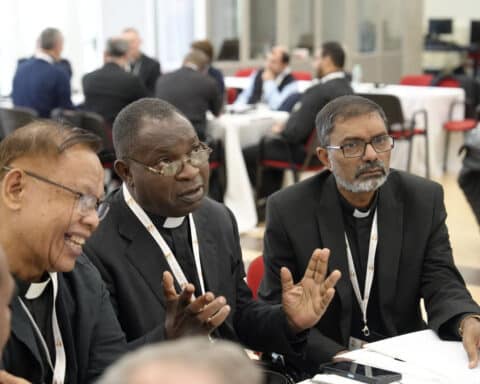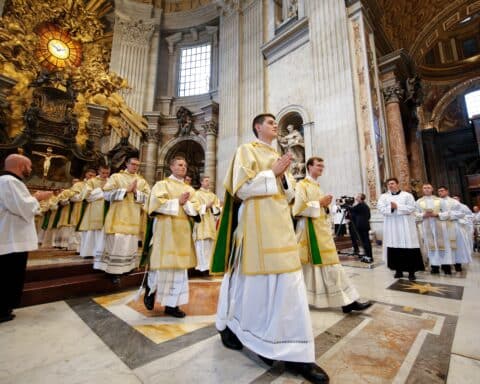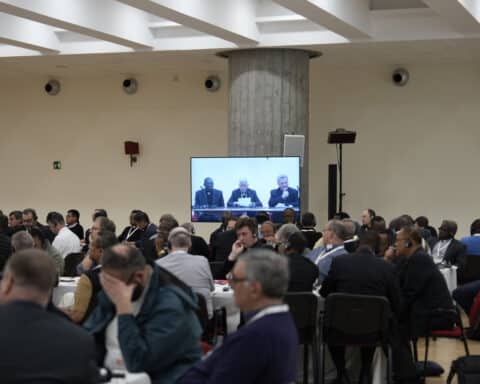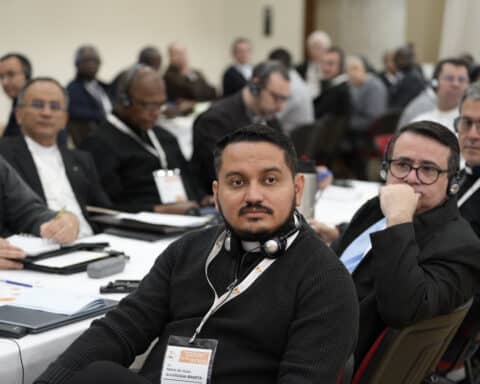NAIROBI, Kenya (OSV News) — As the synod discussing the future of the Catholic Church wraps up in Rome, bishops in Africa reiterated their opposition to homosexual acts and their support for Church teaching on homosexuality, a topic that appeared in synodal conversations several times.
In response to a question about same-sex unions among several other questions that five cardinals submitted to Pope Francis, known as “dubia,” the pontiff said when the assembly was about to open that “we cannot be judges who only deny, reject and exclude,” which prompted media reports saying the Catholic Church may in fact open the path to blessing same-sex couples. The five cardinals had challenged Francis to affirm the church’s position on homosexuality, ahead of the Oct. 4-29 world Synod of Bishops on synodality.
Such reports on the pope’s response are receiving a cold reception among the bishops in Africa, where homosexual activity is rejected as standing in contradiction with Christian values, God’s natural order and African culture.
“The stand of the church is very clear about it. I don’t even need to say it myself … the issue is also being handled at the synod,” Archbishop Baptist John Odama of Gulu, Uganda, told OSV News in a telephone conversation. “Those acts are not OK,” he said.
The church teaches that “men and women with homosexual tendencies ‘must be accepted with respect, compassion and sensitivity. Every sign of unjust discrimination in their regard should be avoided,'” according to the Catechism of the Catholic Church. It also teaches that sexual love is reserved for marriage between a man and woman.
Other pressing issues in Africa
In Kenya, the bishops have remained consistent in their opposition to homosexual activity, even months ahead of the synod.
“LGBT is illegal in Kenya and should be prohibited. … We are talking about human values and how God has created his nature. If we do this (allow homosexuality), we are fighting against nature,” Archbishop Philip Anyolo of Nairobi, Kenya, told journalists in March. “And honestly, nature cannot forgive. It is very cruel when it’s affected or attacked in one way or another,” he said. Requests from OSV News for comment since then have remained unanswered.
Some African prelates also said the continent has more pressing issues, including droughts, climate change and the rising cost of living.
In Africa, most countries have laws that criminalize homosexuality. Of the 66 countries that criminalize homosexuality worldwide, over 30 are in Africa. The law criminalizing the acts are seen as colonial relics that are vague in their wording, according to analysts, pointing to such terms as “carnal knowledge against the order of nature” that appear in the legislation.
Early this year, Pope Francis said in an AP interview that homosexuality was not a crime, but it was a sin. Later, in a letter to U.S. Jesuit Father James Martin, editor-at-large for America magazine and founder of a ministry for Catholics who identify as LGBTQ+, the pope clarified that he meant “homosexual acts,” not homosexuality itself, are a sin, “as is any sexual act outside of marriage.” He added that he “would tell whoever wants to criminalize homosexuality that they are wrong,” a remark seen as a veiled reference to countries, mainly in Africa, which have laws banning the practice.
Uganda’s controversial law
In May, the Ugandan president signed one of the world toughest laws against homosexuality, amid global condemnation.
The law imposes a death penalty for some forms of so-called aggravated homosexual acts (same-sex sexual relations involving a minor and other categories of vulnerable people) and proposes life imprisonment of people engaging in the homosexual acts. It also punishes those who advocate for the rights of LGBTQ+ people or provide services to them.
As the law enraged the international community and human rights groups and frightened gay organizations, it also received backing from the Anglican Church and others, including evangelical and Pentecostal groups.
“We are grateful the current Act affirms the merits of existing provisions of the current penal code. We are grateful the Act builds on existing laws by offering better protection of children,” Anglican Archbishop Stephen Kaziimba Mugalu said in a statement May 29.
Archbishop Mugalu, however, said the church affirmed life and did not support the death penalty for grave acts of “defilement” and homosexuality. Instead, the Anglican Church in Africa backed life imprisonment.
The Catholic Church in Uganda has not issued an official statement on the law, but Archbishop Odama said the law was in place to “protect children” who were being “preyed on” by homosexuals.
“You see, for us we saw it from the point of view of the children. Children are being distorted by the practice of homosexuality. They are diverted from growing up in the most normal way. They are supposed to take the life of homosexuals, which is totally against their rights,” the archbishop said, terming his remarks as his personal view. “Secondly, they are being abused. That is the most painful thing,” he said in reference to some acts of abuse committed by homosexuals.
Blessing same-sex unions
At the same time, while some churches in the West, like in Germany, are ready to bless same-sex unions, African clerics say the experiences of the church and LGBTQ+ issues on the continent are different from that of Europe or North America.
According to Father Joachim Omolo Ouko, an Apostle of Jesus priest of the Diocese of Kisumu, in Europe and the U.S, many same-sex couples or partners often go to church and kneel before a priest for blessings.
“But I witnessed that the priests were (sometimes) refusing (to offer the blessing) saying, ‘No, you are publicly known as a homosexual or gay and I cannot bless you.’ (I think) that is what the pope was referring to — that you can bless anyone who has asked,” said Father Ouko.
He explained that blessing a person — even when you know he is a homosexual, gay or lesbian — is not a big issue since this is their faith.
“But you cannot administer the sacraments on him or her. That is not allowed,” said Father Ouko, who was hoping that the synod would make “the distinction and that is not going to happen.”
The priest pointed out that LGBTQ+ issues are not in the open in Africa, unlike the West, where people say they are openly gay and “proud of it.” He however cautioned that despite Africa rejecting homosexuality, it was not right to abuse their human dignity or human rights.
“We cannot make (anti-homosexuality) laws that will … put them in prison for long or even kill them,” said Father Ouko. “We are talking about mercy and forgiveness. … Maybe these people might convert and change. We give them room for forgiveness and change.”





